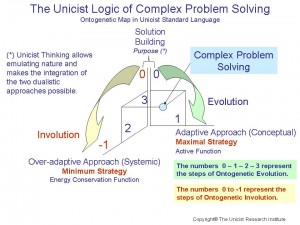This post is excerpted from Peter Belohlavek.
The complexity of a problem is an objective / functional characteristic and not a matter of opinions. By just focusing on three aspects of complexity it is possible to define if a problem is complex:
1) Does the problem have open boundaries or is it isolated?
2) Is it ruled by univocal cause-effect relationships or are they bi-univocal ones?
3) Is it integrated by variables or is it necessary to apprehend it as a unified field?
When the problem is complex, it is necessary to apprehend its concept in order to be able to manage the dynamics of its unified field. On the other hand, when the problem is simple, a systemic approach suffices because the problem can be managed as being static.
The psychic economy principle defines that the brain always uses the less energy consuming pathway to solve a problem. It is necessary to know the actual problem an individual is solving in order to understand if the pathway s/he chose is functional or not.
An adaptive approach to reality is an energy consuming activity, which requires making the effort of apprehending the concept that defines the “stem cell” of the solution in order to be able to solve a complex problem.
This is meaningful when individuals are truly solution focused, because the energy is reloaded as soon as “the solution” has been achieved. But this effort becomes meaningless when individuals are focused on developing “their solution” and not “the solution”.
Over-adaptive approaches are low-energy consuming activities that suffice to deal with systemic problems and to avoid personal risks when developing solutions. That is why individuals switch from an adaptive approach to an over-adaptive approach when they have no full commitment with the building of solutions and do not manage the concept of what is being done.
You can learn about the “Drivers of Human Behavior” at: http://www.unicist.org/repo/#Psychology
